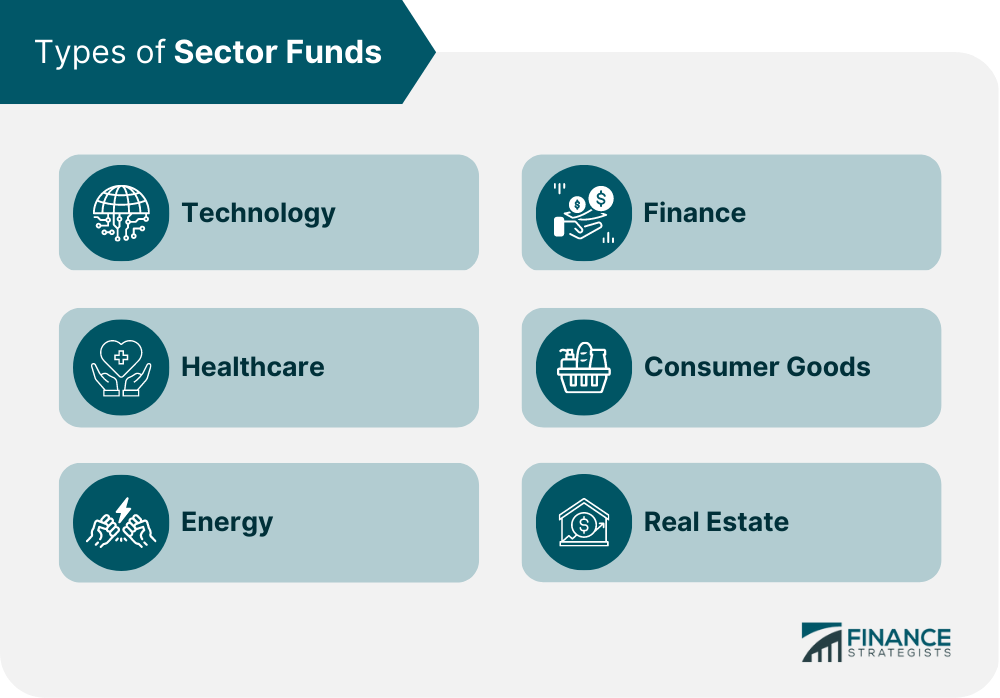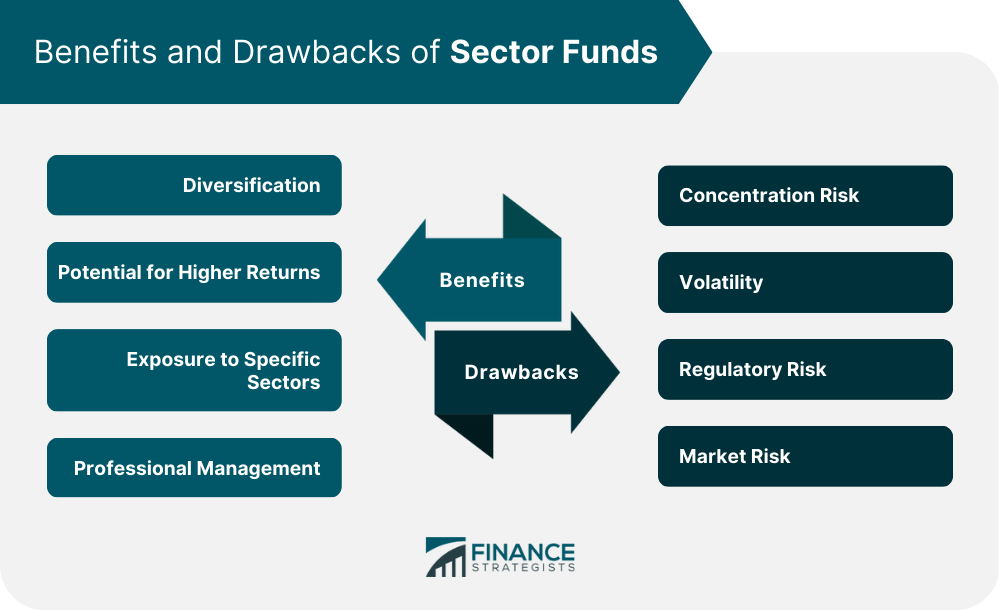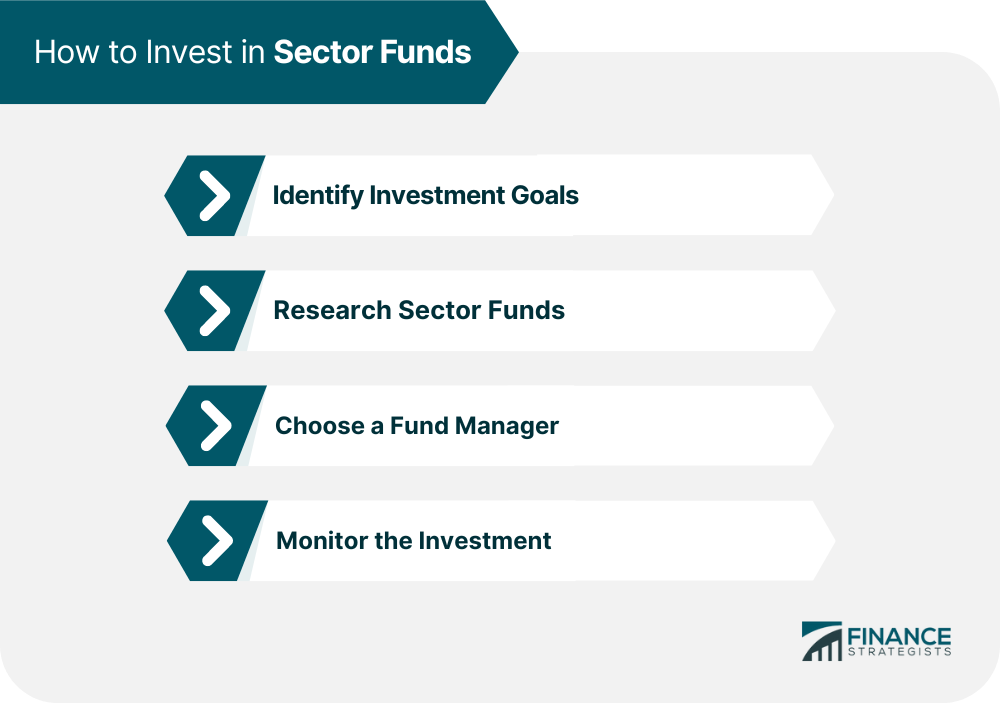What Are Sector Funds?
Sector funds are a type of mutual fund or exchange-traded fund (ETF) that invests in a specific sector or industry of the economy, such as technology, healthcare, energy, finance, consumer goods, or real estate.
Rather than investing in a broad range of companies across various sectors, sector funds focus on a particular industry, allowing investors to gain targeted exposure to specific market areas.
The goal of sector funds is to achieve returns that outperform the overall market by investing in companies within a specific sector that is expected to perform well.
However, they are also more susceptible to market fluctuations and specific sector risks, making them a more specialized and potentially higher-risk investment option.
Types of Sector Funds
The most common types of sector funds are related to technology, healthcare, energy, finance, consumer goods, and real estate.
Technology Sector Funds
Technology sector funds invest in companies that operate in the technology industry, such as Apple, Amazon, Microsoft, and Facebook. These companies are involved in various areas, such as software development, hardware manufacturing, e-commerce, and social media.
Technology has been one of the best-performing sectors recently, with companies experiencing strong revenue growth and high profitability.
However, this sector is also highly volatile, and investors should know the risks associated with investing in technology stocks.
Healthcare Sector Funds
These funds invest in businesses that are engaged in the healthcare industry, such as pharmaceutical companies, medical device manufacturers, and healthcare providers.
These companies are involved in various areas, like drug development, medical research, and patient care. Healthcare is known as a defensive sector, meaning that it tends to perform well during economic downturns, as people will always require medical care.
Nonetheless, this sector is highly regulated, and investors should be wary of the risks of purchasing healthcare stocks.
Energy Sector Funds
Energy sector funds invest in oil and gas producers, renewable energy companies, utilities, and any other companies that operate in the energy industry.
These companies are involved in various areas, such as exploration, production, transportation, and distribution of energy resources.
The energy sector is highly cyclical, meaning that it tends to perform well during periods of economic growth and performs poorly during economic downturns.
It is important to note that this sector is also highly dependent on government policies and regulations. Investors should be aware of the risks associated with trading in energy securities.
Finance Sector Funds
These funds trade in companies that conduct business in the finance industry, such as banks, insurance companies, and investment firms. These companies are involved in various areas, such as lending, insurance, asset management, and investment banking.
The finance sector is highly regulated, and it tends to perform well during periods of economic growth. However, this sector is also exposed to interest rates and credit risk. You should be aware of the potential risks of trading in this sector.
Consumer Goods Sector Funds
Consumer goods sector funds bankroll companies that do business in the consumer goods industry, like retailers, food and beverage companies, and consumer electronics manufacturers. This sector is involved in the manufacturing, distributing, and marketing consumer products.
Like the energy sector, consumer goods are highly cyclical. It performs poorly during contractions and recessions and does well during periods of economic growth.
Despite this, the consumer goods sector is also very competitive. It is essential for investors to consider the benefits and risks associated with this sector.
Real Estate Sector Funds
These funds invest in companies such as real estate investment trusts (REITs), real estate developers, and property managers. These companies are involved in various areas, like the ownership, development, and management of real estate assets.
The real estate sector is greatly sensitive to interest rates and economic cycles, meaning its performance fluctuates with the market. However, this sector is also highly dependent on government policies and regulations.

Benefits of Investing in Sector Funds
Consider the following advantages of trading in sector funds:
Diversification
These funds can help investors expand their portfolios by providing exposure to specific sectors of the economy. By investing in a sector fund, investors can gain access e to a specific industry without having to trade in individual stocks.
Diversification helps reduce the overall risk of their investments, as the performance of one sector is less likely to have a significant impact on the entire portfolio.
Potential for Higher Returns
Sector funds afford you the possibility of generating higher returns than broad-based funds because they are concentrated in specific sectors that are expected to outperform the market.
For example, if an investor believes that the technology sector will perform well in the future, they can invest in a technology sector fund.
If the technology sector outperforms the overall market, the investor could possibly earn higher returns than they would have with a broad-based fund.
Exposure to Specific Sectors
These funds give investors access to specific sectors of the economy. It can be beneficial for investors who have a particular interest in a particular industry or who believe that certain sectors will outperform others over a particular time frame.
Sector funds can also be used to gain exposure to a specific sector without investing directly in individual stocks.
Professional Management
Sector funds are managed by expert professional fund managers who have comprehensive experience in the specific sector that the fund invests in.
These managers have access to research and resources that individual investors may not have access to, which can help them make better-informed investment decisions.
The fund managers also manage the portfolio on behalf of investors, making it a convenient option for those who do not have the time or expertise to manage their investments.
Drawbacks of Investing in Sector Funds
Sector funds are associated with concentration risk, volatility, regulatory uncertainty, and market risk.
Concentration Risk
Sector funds are focused on specific sectors, which means that the fund's performance is highly dependent on the performance of that sector. If the sector performs poorly, the fund will likely underperform the overall market.
This concentration risk can be mitigated by diversifying across multiple sectors or investing in broad-based funds.
Volatility
Sector funds are often more volatile than broad-based funds because they are concentrated in specific sectors.
The fund's performance is very dependent on the performance of that sector, which can be affected by various factors such as economic conditions, government policies, and competition.
Investors should be prepared for the potential volatility of sector funds. It makes sector funds more suitable for people who have a long-term investment horizon.
Regulatory Risk
Some sectors, such as healthcare and finance, are highly regulated, which can increase the regulatory risk associated with investing in sector funds that focus on these sectors.
Changes in government policies and regulations can have a significant impact on the performance of these sectors and the funds that invest in them.
Market Risk
Like individual stocks, bonds, or other securities, sector funds are still subject to market risk or the risk of a decline in the overall market. While sector funds are concentrated in specific sectors, they are still affected by broad market trends and economic conditions.
Investors should know the potential for market risk when investing in sector funds.

How to Invest in Sector Funds
If you are interested in investing in sector funds, here are the basic steps:
Identify Investment Goals
The first step in investing in sector funds is to identify your investment goals. It requires a comprehensive evaluation of your financial situation, including your current position and future financial goals.
It is crucial to understand the level of risk you are willing to undertake and investment time horizon before investing. When identifying your investment goals, you need to consider the specific reasons why you want to invest in a particular sector fund.
For instance, you may want to invest in a particular sector to take advantage of its potential for higher returns or to diversify your portfolio across different sectors to manage risk effectively.
Research Sector Funds
Investors should examine the various funds available to determine which sectors they want to invest in. It is essential to conduct detailed research on the sector funds to make informed decisions that align with your investment goals, risk tolerance, and time horizon.
When researching sector funds, consider how it has performed in both bear and bull markets. It will help you identify sector funds that have consistently performed well and those that are more volatile.
Another critical factor to consider when researching sector funds is the fund’s total expense ratio or the fee charged for managing the fund. Lower expense ratios generally mean higher returns, so it is crucial to choose a sector fund with a low expense ratio to maximize your returns.
Furthermore, consider the assets under management (AUM) of the sector fund. Sector funds with a large AUM are generally more stable, making them less volatile and potentially less risky.
Choose a Fund Manager
A fund manager is responsible for selecting stocks for the sector fund and making investment decisions, making them a vital contributor to the overall performance of the fund. Therefore, it is essential to choose a manager with the right experience, expertise, and investment philosophy.
Consider the manager’s track record of handling similar funds. Review their past performance to determine whether they have consistently delivered returns that align with your investment goals.
You should also review the fund manager's investment philosophy. Each manager has a unique style that determines how they select stocks for the fund. Understanding their investment philosophy helps you know whether it aligns with your investment goals and risk tolerance.
Monitor the Investment
Investors should monitor their sector fund investments regularly to ensure that they are still aligned with their investment goals and risk tolerance.
Keep track of the fund's performance against the benchmark index and compare it to the performance of other funds in the same sector. This comparison will help you evaluate the fund's performance and determine whether it meets your investment objectives.
You should also monitor macroeconomic factors that affect the sector, such as changes in regulations, market trends, and technological advancements.
Further, periodically re-evaluating your investment strategy is essential to ensure that it still aligns with your investment goals and risk tolerance. Consider any changes in your financial situation or investment objectives that may require a shift in your investment strategy.

Comparison With Other Investment Options
You should consider other possible investments available that may be better suited to your specific needs, goals, and risk profile.
Index Funds
Index funds are passive funds that track a particular index, such as the S&P 500 or the NASDAQ 100. They offer investors exposure to a broad range of stocks and are a good option for investors who want to diversify their portfolios.
However, they do not provide exposure to specific sectors, which is a key advantage of sector funds.
ETFs
ETFs are similar to mutual funds but trade on exchanges like stocks. They allow investors access to specific sectors and are more liquid than mutual funds. However, they can be more volatile and may have higher expense ratios.
Mutual Funds
Mutual funds are similar to sector funds but invest in a broader range of stocks. They expose investors to specific sectors but also offer diversification across multiple sectors. Nonetheless, they may have higher expense ratios than sector funds.
Final Thoughts
Sector funds are a great way for investors to gain exposure to specific sectors of the economy and potentially generate higher returns. They provide investors with diversification, exposure to specific sectors, and professional management.
However, they are also subject to concentration risk, volatility, regulatory risk, and market risk. Investors should consider their investment goals, risk tolerance, and the potential risks associated with sector funds before investing.
You should also research the various sector funds available, choose a fund manager with expertise in the specific sector, and monitor their investments regularly. Sector funds can be a great addition to a well-diversified portfolio and can help investors achieve their financial goals.
Consult a qualified financial advisor or wealth management professional for further details on sector funds to ensure you select one that best suits your goals, risk tolerance, and investment time horizon.
Sector Funds FAQs
Sector funds are a type of mutual fund or exchange-traded fund (ETF) that invests in a specific sector or industry of the economy, such as technology, healthcare, energy, finance, consumer goods, or real estate.
Investing in sector funds allows you to gain targeted exposure to specific areas of the market and potentially achieve returns that outperform the overall market. It also allows you to diversify your portfolio across different sectors and manage risks effectively.
Sector funds are more susceptible to market fluctuations and specific sector risks, making them a more specialized and potentially higher-risk investment option. Investing in a single sector can lead to a lack of diversification and may result in significant losses if the sector experiences a downturn.
To determine which sector fund to invest in, you should conduct thorough research on the various sector funds available. Consider factors such as historical performance, expense ratios, the management team, and the specific risks associated with the sector.
Yes, investing in sector funds carries risks, and you can lose money. Sector funds are more specialized and potentially higher-risk investment options than broad-based funds. Investing in a single sector can lead to a lack of diversification and may result in significant losses if the sector experiences a downturn. It is always advisable to carefully evaluate your investment goals and risk tolerance before investing in sector funds and seek the advice of a financial advisor.
True Tamplin is a published author, public speaker, CEO of UpDigital, and founder of Finance Strategists.
True is a Certified Educator in Personal Finance (CEPF®), author of The Handy Financial Ratios Guide, a member of the Society for Advancing Business Editing and Writing, contributes to his financial education site, Finance Strategists, and has spoken to various financial communities such as the CFA Institute, as well as university students like his Alma mater, Biola University, where he received a bachelor of science in business and data analytics.
To learn more about True, visit his personal website or view his author profiles on Amazon, Nasdaq and Forbes.











